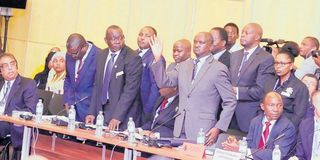JPM opens new chapter in relations with private sector

Senior officials of various state agencies attend the 11th Tanzania National Business Council meeting at State House, Dar es Salaam, yesterday. PHOTO | STATE HOUSE
Dar es Salaam. President John Magufuli yesterday sent a strong signal that his government wishes to see a new, closer and mutually beneficial engagement with the private sector.
This is key to averting further crisis in private sector growth and boost the industrialisation agenda.
Chairing the 11th Tanzania National Business Council (TNBC) meeting at State House, President Magufuli struck a conciliatory note on taxation, and directed the Tanzania Revenue Authority (TRA) and the Ministry of Finance and Planning to be considerate in their assessment of outstanding taxes.
“TRA and the Ministry of Finance should be considerate to businesses with huge tax arrear bills to avoid sending some of them into bankruptcy. We should not be rigid...let’s create a friendly environment for businesses to enable them pay taxes because we need them,” Dr Magufuli noted.
He also told off “rogue” tax collectors who harass businesspeople and close the businesses of those who fail to pay taxes in the name of the Hapa Kazi Tu (nothing but work) slogan.
“I never sent them to harass businessmen. These are unprofessional tax collectors who are causing harm to businesses and denying the government much-needed revenue,” President Magufuli noted.
The government’s apparent change of policy on taxes should come as a huge relief to the businesses community, which endured two years of an aggressive tax collection campaign that saw many businesses – mainly, small and medium firms – close shop. Many retail outlets in the busy Kariakoo trading hub in Dar es Salaam and upcountry were closed down after failing to pay huge sums in outstanding taxes.
The new determination to mend fences with the private sector was also reflected by the manner in which President Magufuli chaired yesterday’s meeting, which was televised live from State House.
He gave participants from the business community about five hours to air their concerns, and asked ministers and heads of public institutions to respond to some of them. Dr Magufuli also promised to give feedback on most of the concerns within a week.
“I love the business community. Businesspeople are our most important stakeholders. They provide the government with much-needed revenue. I know it’s not easy to pay taxes, but people should be encouraged to pay them. Those who evade should be penalised,” President Magufuli noted.
Meanwhile, the business community urged the government to review its tax policy if the industrialisation goal is to be attained.
Speaking at the TNBC meeting yesterday, they said that not only were there too many taxes, but tax refunds also took too long to be paid.
Confederation of Tanzania Industries chairman Samuel Nyantahe said the government was withholding over Sh35 billion in tax refunds owed to food, beverage and pharmaceutical firms. He also noted that the 25 per cent import duty on industrial sugar was too much for manufacturers.
Initially, importers of industrial sugar were being charged 10 per cent duty, but the government raised it to 25 per cent through the 2015/16 Budget.
Dr Nyantahe said the additional 15 per cent was a big burden on industries. “This increases production costs, and makes our products less competitive,” he noted.
Tanzania Private Sector Foundation executive director Godfrey Simbeye lamented what he said was an unfavourable revenue collection system.
He said the presumptive tax system should be replaced with a self-assessment system.
Tanzania Association of Tour Operators (Tato) chairman Wilbard Chambulo said a multiplicity of taxes was undermining the tourism sector, which, he added, was subjected to at least 39 different taxes.
He said Tato members would like to see the harmonisation of the taxation system for them to broaden their business horizons.



